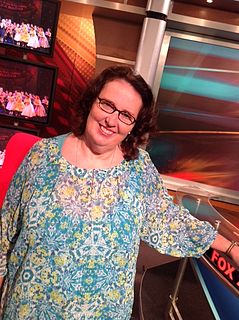A Quote by Barbara Taylor Bradford
At the age of fifty-six Eleanor Stoddard was still a beautiful woman. She owned three hotels in France and another two in England. From nothing at all, she had built an empire. Eleanor had it all. Her one weakness was the young man sleeping beside her.
Related Quotes
Well, when Eleanor Roosevelt's mother dies, she goes to live with her Grandmother Hall. And her Grandmother Hall is in mourning. She's in widow's weeds. She's in her 50s, but appears very old. And she's exhausted from raising rather out-of-control children. Her favorite daughter, Anna, has died (Eleanor's mother), and she has living at home two other sons, Vallie and Eddie. And they are incredible sportsmen, incredible drinkers, out-of-control alcoholics.
She writes that one of the moments that she felt most useful was when her mother had a headache, and she would stroke her head and rub her forehead. And I think Eleanor Roosevelt's entire life was dedicated to two things: (one) making it better for all people, people in trouble and in need, like her family.
Her mother died at the age of 29, essentially turning her face to the wall and deciding to die. And so we can only imagine the agony she felt. And Eleanor Roosevelt really wanted to make her mother happier, and - and to make her live, you know, make her want to live. And there's something about, you know, when your mother dies, this sense of abandonment. I think Eleanor Roosevelt had a lifelong fear of abandonment and sense of abandonment after her parents' death.
Well, in Washington, this is a very hard time for Eleanor and Franklin. This is when Lucy Mercer first appears. And Lucy Mercer is Eleanor Roosevelt's own secretary. Very beautiful young woman, not unlike Eleanor Roosevelt: tall, blonde, thick haired. And FDR is having an affair with her, which Eleanor Roosevelt finds out when FDR returns from Europe in 1918 with the famous flu of 1918.
From an early age she had developed the art of being alone and generally preferred her own company to anyone else’s. She read books at enormous speed and judged them entirely on her ability to remove her from her material surroundings. In almost all the unhappiest days of her life she had been able to escape from her own inner world by living temporarily in someone else’s, and on the two or three occasions that she had been too upset to concentrate she had been desolate.
A lot of people say that Eleanor Roosevelt wasn't a good mother. And there are two pieces to that story. One is, when they were very young, she was not a good mother. She was an unhappy mother. She was an unhappy wife. She had never known what it was to be a good mother. She didn't have a good mother of her own. And so there's a kind of parenting that doesn't happen.
And if you look at pictures of Eleanor between 1918 and 1921, she becomes anorexic. She really loses a tremendous amount of weight. That's when her teeth really go bad. It's a terrible, terrible time for her. And she has five children, ranging in age from three to 10. It's an emotionally terrible ordeal.
Eleanor Roosevelt loved to write. She was a wonderful child writer. I mean, she wrote beautiful essays and stories as a child. And Marie Souvestre really appreciated Eleanor Roosevelt's talents and encouraged her talents. Also, she spoke perfect French. She grew up speaking French. She's now at a french-speaking school where, you know, girls are coming from all over the world. Not everybody speaks French.
"Baby, you know?" my mother once said to me. "I think you're the greatest woman I've ever met - and I'm not including my mother or Mrs. Eleanor Roosevelt in that." She said, "You are very intelligent and you're very kind, and those two qualities do not often go together." Then she went across the street and got in her car, and I went the other way down to the streetcar. I thought, "Suppose she's right. She's intelligent - and she's too mean to lie." You see, a parent has the chance - and maybe the responsibility - to liberate her child. And my mom had liberated me when I was 17.
I think Eleanor Roosevelt always had a most incredible comfort writing letters. I mean, she was in the habit of writing letters. And that's where she allowed her fantasies to flourish. That's where she allowed her emotions to really evolve. And that's where she allowed herself to express herself really fully, and sometimes whimsically, very often romantically. And it really starts with her letters to her father, who is lifelong her primary love.





























